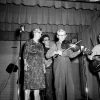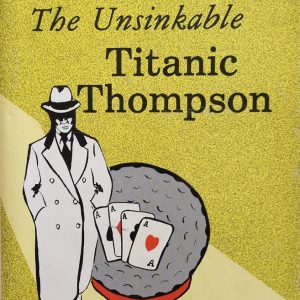calsfoundation@cals.org
Titanic Thompson (1892?–1974)
Titanic Thompson was arguably America’s most notorious gambler. He spent most of his early life in northwestern Arkansas.
Titanic Thompson was born Alvin Clarence Thomas on November 30, 1892 or 1893, in Monett, Missouri, a town in the Ozarks about thirty miles north of the Arkansas-Missouri state line. There is confusion about his exact year of birth. Military records indicate 1892, while the Social Security Administration lists it as 1893.
Thomas was an infant when his father, Lee Thomas, deserted the family. After their divorce, his mother, Sarah, married Willie Hendricks, a hog farmer living outside Rogers (Benton County). Thomas grew up on that Benton County farm, honing skills that would prove handy in his later years, such as shooting, playing checkers and dominos, and pitching pennies. Likewise, his exceptional athletic ability combined with extraordinary hand-eye coordination would work to his advantage.
Attending school off and on, Thomas was basically illiterate. Tensions with his stepfather contributed to his leaving home at the age of sixteen, supposedly with less than a dollar to his name.
His first stop was in Monett, his birthplace, where he sold maps of the United States for a dollar each during the day and played cards and shot pool in the evenings. Thomas soon joined the medicine show of Colonel Adam Beaugardus, putting on shooting demonstrations in the Midwest. It was not long before he stepped away from the show’s carnival-like atmosphere to gamble full time.
In Marked Tree (Poinsett County) in 1910, Thomas won $2,000 and a small riverboat named The Rambler from Joe Green, shooting dice. A melee ensued, and Thomas killed a man with a hammer, claiming self-defense. During the “trial,” the sheriff gave Thomas the option of giving up the cash and the title to the boat or going to jail. Thomas chose the former and promptly left town. During the course of his career, Thomas shot and killed four other men, all of whom were attempting to steal his winnings from poker games or golf matches. No charges were ever filed.
In the spring of 1912, Thomas arrived in Joplin, Missouri, where he won $500 on a bet with Snow Clark, a local gambler. When asked the name of the man who had gotten the better of him, Clark is said to have replied, “Beats me. But it ought to be Titanic, the way he’s been sinking everybody around here.” The British ocean liner Titanic had sunk days earlier after colliding with an iceberg in the north Atlantic. Thomas liked Titanic for a nickname and adopted it.
Inducted into the U.S. Army in April 1918 during World War I, Thomas was sent to Anniston, Alabama. Almost immediately promoted to sergeant, Thomas found gambling with his subordinates to be lucrative. Upon his discharge less than eight months later, Thomas left the base with nearly $60,000 in his duffel.
At some point, a newspaper reporter got his name wrong, identifying him as Thompson. Deciding that had a better ring to it than Thomas, he was known as Titanic Thompson from then on.
In his early thirties, Thompson took up golf, quickly developing his game under the tutelage of a club professional in the San Francisco, California, area. He made good money across the country hustling affluent members of country clubs. In fact, Thompson was arrested on December 29, 1929, in Little Rock (Pulaski County), following several weeks of golf in the city, getting his photo on the front page of the Arkansas Gazette on December 31. A local businessman, taking exception to Thompson’s suggestion that they play a round for $2,000, had complained to the police.
Thompson’s golfing prowess was truly extraordinary. Celebrated golfer Ben Hogan said, “He can play right- or left-handed; you can’t beat him.” One of Thompson’s favorite ploys was to barely emerge victorious over an opponent while golfing right-handed before suggesting a double or nothing second round with Thompson playing left-handed. Most rivals jumped at the chance, not realizing that he was a natural lefty. When asked why he did not join the professional ranks, Thompson had a ready answer: “I could not afford the cut in pay.” Thompson cleared more in a week relieving the country club set of their monies than the average PGA pro made in a year.
Thompson suffered a few setbacks, and one took place in El Dorado (Union County). After he had beaten the best resident golfers and won a local shooting match, he established a bookmaking operation in town. H. L. Hunt, who later did very well in the oilfields of Texas and southern Arkansas, ran a gambling operation in El Dorado at the time, and he placed a large bet with Thompson. When Hunt won, Thompson asked if he would be willing to place another wager, giving Thompson a chance to cover some of his losses, with Hunt choosing the game. He selected checkers. Learning that Hunt was a known checkers champion, Thompson left El Dorado.
Author Damon Runyon is said to have based Sky Masterson, the habitual gambler in his short story “The Idyll of Miss Sarah Brown,” on Titanic Thompson. The story provided the foundation for Guys and Dolls, the long-running and Tony Award–winning Broadway musical. In the Hollywood film adaptation, Marlon Brando played the role of Sky Masterson.
Titanic Thompson married five times. His usual routine was to wed a teenager, live with her a short while, and then arrange for her financial support before filing for divorce. Thompson’s wives were Nora Trushel (age seventeen); Alice Kane (seventeen); Jo Ann Raney (fifteen); Maxine Melton (sixteen); and Jeannette Bennett (eighteen). In between marriages, he dated Hollywood stars including Myrna Loy and Jean Harlow.
He died in a nursing home near Dallas, Texas, on May 19, 1974, survived by three sons.
For additional information:
Bradshaw, John. Fast Company. New York: Harper’s Magazine Press, 1975.
Cook, Kevin. Titanic Thompson. New York: W. W. Norton & Company, 2011.
Stowers, Carlton. The Unsinkable Titanic Thompson. Maple Ridge, British Columbia: Palmer Magic, 1982.
Wade, Don. Wanna Bet? New York: Thunder’s Mouth Press, 2005.
Joe David Rice
Little Rock, Arkansas
 Early Twentieth Century, 1901 through 1940
Early Twentieth Century, 1901 through 1940 Folklore and Folklife
Folklore and Folklife The Unsinkable Titanic Thompson
The Unsinkable Titanic Thompson 




Comments
No comments on this entry yet.